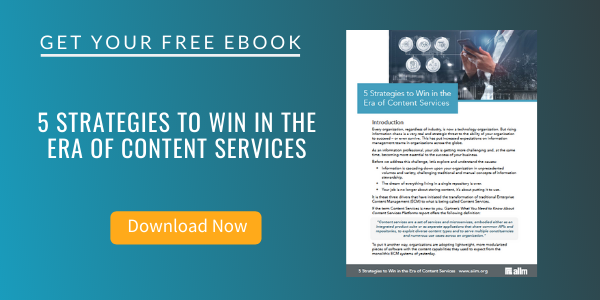
Insurance Companies: How to Solve Your Talent Issues with Digital Labor
Solve your Talent Problems with Digital Labor & Content Services Solutions
Every industry is facing accelerating disruptive challenges, but perhaps none more so than the insurance industry, one of the original “crossing the chasm" industries for content management. Consider the following data points highlighting the need for a more innovative approach to digital labor and content services:
1) “According to a study by McKinsey and Co., 25% of the professionals in the insurance industry will retire by 2018, leaving an enormous talent and experience gap in an industry that is already experiencing a worker shortage.” Property Casualty 360.
Implication: Unless organizations can begin to access and interpret all of the "dark" data they have accumulated over the past three decades, they run the risk that a significant source of knowledge will exit the building when the baby boomers retire. The key to competitive advantage does not rest on simply hiring more workers, but on maximizing the productivity of existing workers through technology.
2) “Millennials will comprise more than one of three adult Americans by 2020 and 75 percent of the workforce by 2025.” Brookings Institution.
Implication: Technology expectations in the workplace are about to change dramatically. Organizations with business systems that resemble those that might be found in a computer museum will find themselves at a distinct competitive disadvantage when it comes to hiring the best talent.
3) 57% (of millennials) say it is important to work for a company that provides flexibility to work outside the office. 48% say it is important to work for a company that is “very innovative.” While Gen Z is only slightly more familiar with the insurance industry than millennials, more than 60% of Gen Z and millennial respondents feel unfamiliar with the industry. The Future of Insurance: Bye-Bye Boomers, Hello Digital Natives.
Implication: Inflexible systems that are not designed for a modern mobile workforce will further exacerbate the brain drain that will occur as the baby boomers leave the workforce.
4) Only 4% of Millennials consider insurance to be an attractive industry in which to work, with many describing the industry as “boring.” The Hartford’s 2015 Millennial Leadership Survey.
Implication: Insurance companies face a perfect storm in the future battle for talent due to:
- Legacy systems that have not been updated and not taking advantage of the latest cloud and mobile technologies.
- A continuing set of compliance and regulatory obligations that are more complicated than the average industry and are not going away.
- An older workforce than average that will soon retire.
- A generation of new employees that has a negative view of the insurance industry.
Based on these data points, it is clear that something needs to change. However, according to PwC’s 2017 Top Issues report, “the industry’s traditional conservatism and the dizzying pace of technological change has made it difficult to change.”
This “traditional conservatism” is based, in part, on the fact that insurance companies do face more significant content management challenges than many other industries.
Insurance organizations must deal with the reality that business must be transacted at the convenience and location of the customers’ choice, in a digital manner that is secure, accessible, and defensible.
Regulatory compliance, customer responsiveness, and operational agility are key to maintaining and growing their customer base. It is also vital for insurers to establish and maintain a solid information ecosystem based on a strong information governance framework that meets or exceeds the regulatory and legal compliance requirements. Most importantly, all of this must be done within a business context of multiple and inconsistent content and process management systems, both “native-born” and acquired.
The Solution to This Complex Set of Challenges is Not Business as Usual
While there are many parts to the puzzle of attracting millennials to the insurance industry, one part of the puzzle is providing an innovative work environment, engaging technology, and pushing systems to address the emerging set of analytics and machine learning opportunities.
While it may seem daunting, attracting millennials is vital for the industry’s success. RhinoDox CEO, Justin Ullman, puts it this way, “Let’s assume that the insurance industry can truly embrace a culture of rapid innovation and attract the talent needed to drive that. While the work ethic of millennials is often questioned, most people can agree that they are innovative, entrepreneurial and purposeful. Put that mindset to work and ask for their best ideas, and there isn’t a better demographic to help a legacy industry like insurance. As long as the right tools, processes, and mindsets are in place, improvement is sure to follow.”
The mission-critical nature of many legacy systems means you cannot just rip them out without unacceptable carnage. The key to this evolution is embracing low- and no-code process solutions, semantic enrichment, modern approaches to enterprise search, and more flexible document databases to extract greater value out of existing systems.
About John Mancini
John Mancini is the President of Content Results, LLC and the Past President of AIIM. He is a well-known author, speaker, and advisor on information management, digital transformation and intelligent automation. John is a frequent keynote speaker and author of more than 30 eBooks on a variety of topics. He can be found on Twitter, LinkedIn and Facebook as jmancini77. Recent keynote topics include: The Stairway to Digital Transformation Navigating Disruptive Waters — 4 Things You Need to Know to Build Your Digital Transformation Strategy Getting Ahead of the Digital Transformation Curve Viewing Information Management Through a New Lens Digital Disruption: 6 Strategies to Avoid Being “Blockbustered” Specialties: Keynote speaker and writer on AI, RPA, intelligent Information Management, Intelligent Automation and Digital Transformation. Consensus-building with Boards to create strategic focus, action, and accountability. Extensive public speaking and public relations work Conversant and experienced in major technology issues and trends. Expert on inbound and content marketing, particularly in an association environment and on the Hubspot platform. John is a Phi Beta Kappa graduate of the College of William and Mary, and holds an M.A. in Public Policy from the Woodrow Wilson School at Princeton University.



